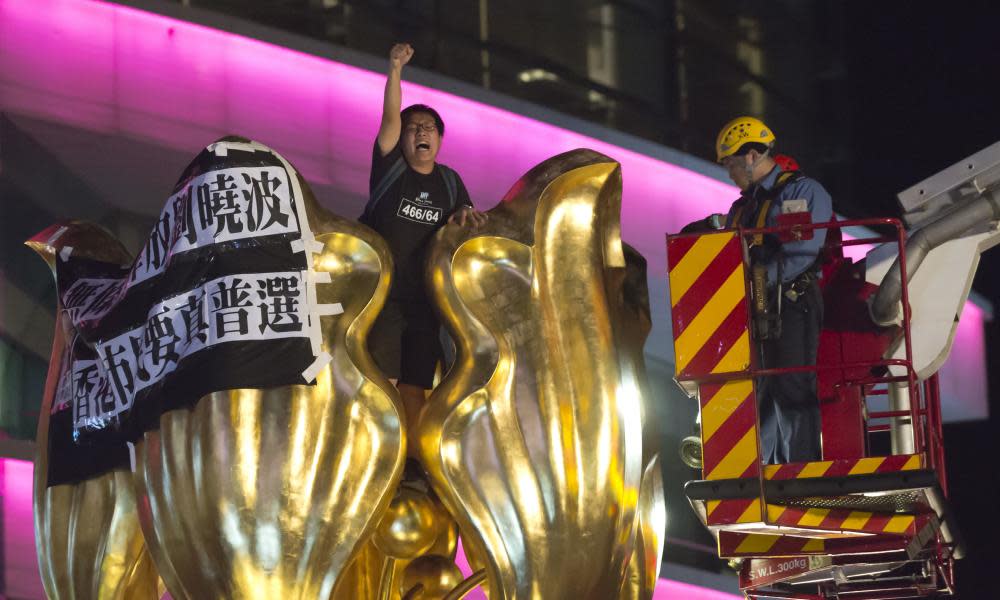British minister accused of 'appeasing' China during human rights talks

Activists have urged Britain to abandon its “appeasement” of Beijing after the foreign office hailed a “constructive and open” conversation with China over human rights even as that country wages what campaigners call its worst crackdown in decades.
British and Chinese officials met in Beijing for a two-day human rights “dialogue” this week as outrage over the treatment of China’s most famous dissident, the Nobel laureate Liu Xiaobo, grew.
Liu, a writer and democracy activist who has languished in jail since 2009, was released on medical parole on Monday after being diagnosed with terminal liver cancer. The news sparked claims that Beijing was guilty of “political murder” and ”deliberate homicide”.
Despite that outcry, a statement released on Wednesday by the newly appointed foreign office minister for Asia and the Pacific struck a more upbeat tone. In it, Mark Field said he was “pleased” by the UK-China Human Rights Dialogue that had been held on 27-28 June and that “the full range of our human rights concerns” had been discussed “in a constructive and open manner”.
Topics included “freedom of expression, freedom of religion or belief, access to justice and ethnic minorities’ rights,” the Conservative MP added.
“The UK strongly believes that respect for human rights is vital for growth and stability, and that these regular talks are an important part of our relationship with China.”
However, Field’s statement made no mention of Liu’s plight. Nor did it reference the severe political chill that has descended on China since president Xi Jinping took power in late 2012. That clampdown has seen top human rights lawyers vanish into secret detention, moderate academics thrown into jail and the publishers of anti-Communist party books snatched in Hong Kong and Thailand.
Sophie Richardson, Human Rights Watch’s China director, slammed the British minister’s failure to publicly mention Liu’s case or the broader assault on human rights underway in China, which some describe as the harshest since the days after the 1989 Tiananmen massacre.
“To pursue these dialogues while abandoning forceful criticism smacks of short-sighted appeasement,” she said, calling for “tough diplomacy”.
“That the UK held a human rights dialogue with China at a time when the latter is torturing Nobel Peace Prize winner Liu Xiaobo, disappearing human rights lawyers, and ripping up [Hong Kong’s] ‘one country, two systems’ - without clearly aspiring to challenge any of those realities - simply shows how badly London has strayed from its purported claims [to defend human rights].”
Richardson’s criticism echoes that of Conservative peer Chris Patten. Speaking to the Guardian last week, Patten, the last governor of Hong Kong, attacked London’s “kowtowing” on issues such as human rights and Hong Kong.
“It is astonishing that we have demeaned ourselves in the way we have. I don’t think that the only way you can have a good and constructive relationship with China is by behaving in that sort of craven way,” he said.
Patten said he feared such “demeaning” behaviour was likely to intensify after Brexit, as Britain scrambled to cement new trade deals. “Kowtowing to Chinese Leninism is not fine,” Patten added in his recently published memoirs.
Field’s comments are likely to cause fresh embarrassment for British diplomats in China. In 2015 Britain was the subject of widespread mockery and criticism in western diplomatic circles in Beijing after it issued a statement marking the United Nations’ Human Rights Day by quoting Xi Jinping and praising what it called Beijing’s efforts to better protect the civil and political rights of its citizens.
That statement was said to have been the work of the Treasury, which was then pushing a “golden era” of relations with China under David Cameron and George Osborne.
British officials defend the regular human rights “dialogue” with China, claiming such meetings can be used to apply pressure over specific violations and are more effective than public denunciations. However, critics say they are ineffective and often little more than a fig leaf for governments keen not to upset Beijing. Earlier this month activists called on the EU to scrap its human rights dialogue with China until there was a realistic prospect of “genuine human rights improvements” there.

 Yahoo News
Yahoo News 
